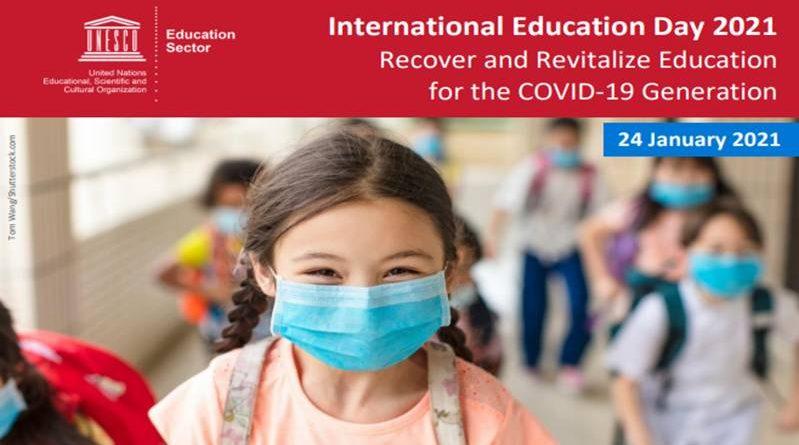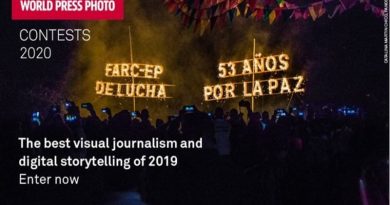The 2021 International Day of Education is celebrated today
The third International Day of Education (January 24) will be marked on Monday 25 January 2021 under the theme ‘Recover and Revitalize Education for the COVID-19 Generation’. Now is the time to power education by stepping up collaboration and international solidarity to place education and lifelong learning at the centre of the recovery.
The global event for the Day will be planned along three main segments: learning heroes, innovations, and financing. It will be organized in partnership with the UNESCO New York Office, UNHQ, the Global Partnership for Education and the Centre for Interdisciplinary Studies (CRI), and feature the participation of partners from the Global Education Coalition. Capturing the spirit of the International Day of Education, CRI and UNESCO have spearheaded a Learning Planet Festival to celebrate learning in all contexts and share innovations that fulfill the potential of every learner, no matter what their circumstances. The CRI will also be unveiling the winners of an essay contest of “Le Petit Prince”.
Education is a human right, a public good and a public responsibility.
The United Nations General Assembly proclaimed 24 January as International Day of Education(link is external), in celebration of the role of education for peace and development.
Without inclusive and equitable quality education and lifelong opportunities for all, countries will not succeed in achieving gender equality and breaking the cycle of poverty that is leaving millions of children, youth and adults behind.
Today, 258 million children and youth still do not attend school; 617 million children and adolescents cannot read and do basic math; less than 40% of girls in sub-Saharan Africa complete lower secondary school and some four million children and youth refugees are out of school. Their right to education is being violated and it is unacceptable.
Recover and revitalize education for the COVID-19 generation
This third International Education Day occurs in the wake of the COVID-19 pandemic that led to a global learning disruption of unprecedented scale and severity. The closure of schools, universities and other learning institutions, as well as the interruption of many literacy and lifelong learning programmes, has affected the lives of 1.6 billion students in over 190 countries. Governments everywhere moved swiftly to offer alternative solutions, but at least one third of the world’s students were not able to access remote learning, while it is estimated that those in low-and lower-middle-income countries have lost nearly four months of schooling compared to six weeks in high-income ones. And, unfortunately, the disruption is still very much ‘with us’.
The pandemic has amplified social, economic and digital inequalities, putting a generation at risk of a learning catastrophe as the UN Secretary-General warned in his Policy Brief on Education and COVID19. But it has also shone light on the centrality of education for every society, as a public common good and the bedrock of social cohesion, well-being and opportunity. As the pandemic enters or worsens second and third waves of COVID-19, forcing countries into new lockdowns, many schools have remained open, even as other institutions and businesses are shut, testifying to the unique importance of their role in society, and the multiple risks – academic, socio-emotional and economic – of relying solely on remote learning solutions.
At the same time, the pandemic has been a wake-up call – to make education systems more resilient to crisis, and more inclusive, flexible and sustainable. It has shown the capacity of systems to innovate, expanding the frontiers of learning possibilities; the enterprise of teachers to ensure learning continuity; and highlighted the immense value education holds for learners, families and communities—indeed losing something, even if only temporarily, functions to clarify its worth.
Action to respond to the pandemic disruption has unlocked and inspired new partnerships, as reflected in UNESCO’s Global Education Coalition that has rallied 160 partners since its launch in March 2020. It has brought organizations together to advocate and galvanize support to education, as witnessed by the Save Our Future Campaign. It has catalyzed cooperation between governments in the early days of the crisis and, more recently, at an extraordinary session of the Global Education Meeting convened by UNESCO, Ghana, Norway and the United Kingdom in October 2020. On this occasion, heads of state and government and ministers from over 70 countries endorsed a Declaration expressing strong commitment to protect education financing and outlining measures to be adopted through the end of 2021 to safeguard education by:
1. Taking every measure to reopen schools safely and inclusively;
2. Supporting all teachers as frontline workers and prioritizing their training and professional development;
3. Investing in skills development for inclusive recovery;
4. Narrowing the digital divide that has prevented one third of the world’s students from accessing education during school closures;
5. Protecting if not increasing education budgets; ensuring that stimulus packages support measures to mitigate learning losses and get the most vulnerable back to school; and increasing the volume, effectiveness and predictability of aid to education.
As a new year begins, now is the time to step up collaboration and international solidarity to place education and lifelong learning at the centre of the recovery and the transformation towards more inclusive, safe and sustainable societies. It is the time to invest in better gearing education systems everywhere to the reality of interdependence that the pandemic has driven in, and to making education a vehicle to foster social justice, peace, respect for diversity, human rights and democratic values.
This International Education Day aims to:
• Highlight commitments and follow-up actions taken to protect education through the recovery, increase inclusion and combat drop-out
• Celebrate initiatives being led by governments, educators, organizations—from global to grassroots efforts—as well as partnerships demonstrating the potential to recommit education to the principles of equity and relevance
• Highlight best practices in laws and policies on equitable finance for education that effectively and efficiently target the most disadvantaged via a tool featured on UNESCO’s Global Education Monitoring Report website, PEER.
• Give voice to the COVID-19 generation to express their concerns and aspirations in the face of a future marked by an economic recession and climate change.
As in 2020, this Day will be organized in partnership with several partners, including the Global Partnership for Education and the Centre for Interdisciplinary Studies (CRI), and feature the participation of partners from the Global Education Coalition. Capturing the spirit of the International Day of Education, CRI and UNESCO have spearheaded a Learning Planet Festival to celebrate learning in all contexts and share innovations that fulfill the potential of every learner, no matter what their circumstances.
International Education Day will be celebrated on Monday January 25, 2021
Capturing the spirit of the International Day of Education, UNESCO and partners have spearheaded the Learning Planet Festival to celebrate learning in all contexts and share innovations that fulfil the potential of every learner, no matter what their circumstances. The winners of an essay contest of “Le Petit Prince” will be unveiled as part of the Day’s celebrations.
Education is a human right
The right to education is enshrined in article 26 of the Universal Declaration of Human Rights. The declaration calls for free and compulsory elementary education. The Convention on the Rights of the Child, adopted in 1989, goes further to stipulate that countries shall make higher education accessible to all.
Education is key to sustainable development
When it adopted the 2030 Agenda for Sustainable Development in September 2015, the international community recognized that education is essential for the success of all 17 of its goals. Sustainable Development Goal 4, in particular, aims to “ensure inclusive and equitable quality education and promote lifelong learning opportunities for all” by 2030.
Challenges to achieving universal education
Education offers children a ladder out of poverty and a path to a promising future. But about 265 million children and adolescents around the world do not have the opportunity to enter or complete school; 617 million children and adolescents cannot read and do basic math; less than 40% of girls in sub-Saharan Africa complete lower secondary school and some four million children and youth refugees are out of school. Their right to education is being violated and it is unacceptable. >
Without inclusive and equitable quality education and lifelong opportunities for all, countries will not succeed in achieving gender equality and breaking the cycle of poverty that is leaving millions of children, youth and adults behind.




